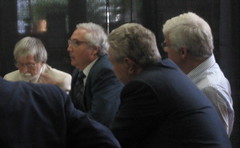I had the privilege of guest lecturing in Bill Imada’s graduate class at USC’s Annenberg School for Communication and Journalism (my alma mater). The title of the class — JOUR 568– is Critical Thinking and Crisis Management and I was asked to demonstrate the importance of social media in crisis communications and to present a case study. Well it turned out not being so much of a lecture — or even a case study for that matter — as it was a critical review of BP’s [lack of] response to the Deepwater Horizon disaster of April 2010 and the ensuing oil spill that leaked into the Gulf of Mexico for nearly 3 months unchecked.
Click through to the videos in the presentation. Especially BP Spills Coffee. Riotous, no? But there’s truth to every bit of the parody. While BP was too focused on its record-breaking earnings and deflecting blame, it needed to address the reality of what was — and is — a very human tragedy in the eyes and on the active social networks of the public. And BP was way too late to that game.
The U.S. government just approved the first permit for deep-water drilling in the gulf since the disaster and there remains no known fix should history repeat itself. But our consumer culture didn’t get to where it is today out of an abundance of caution. This is where crisis management runs counter to traditional public relations. Organizations cannot wait to get involved on social networks such as Twitter and Facebook, they must be proactively engaging and listening to their audiences. Sometimes communication is the only viable regulation.




